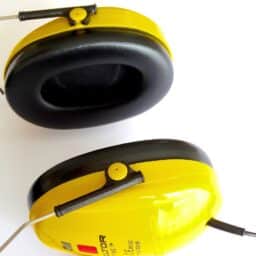Are My Sunglasses Interfering with My Hearing Aids?

If you wear both hearing aids and sunglasses, you may wonder if your sunglasses will interfere with your hearing aids. Nearly 28.8 million Americans could benefit from wearing hearing aids, but many people don’t take advantage of their benefits for various reasons. Hearing aids and sunglasses occupy similar real estate around your ears and can…
How Does Loud Noise Damage Hearing?

The Occupational Safety and Health Administration (OSHA) states that prolonged exposure to sounds above 85 decibels (dB) can lead to permanent damage. Everyday workplace noises, like those from heavy machinery, power tools, production lines and loud music in entertainment venues, put many workers at risk. Without proper precautions, workers may develop hearing loss or tinnitus….
Choosing the Right Hearing Aid for an Active Lifestyle

Spring and summer bring the perfect opportunity to get back to your favorite outdoor activities. Whether you enjoy hiking, biking or morning runs through your neighborhood, staying active is important for your physical and mental well-being. If you’re considering hearing aids, choosing a device that keeps up with your active lifestyle is essential. What Features…
How to Protect Your Hearing During a Concert

According to the World Health Organization (WHO), “Over 1 billion young adults are at risk of permanent, avoidable hearing loss due to unsafe listening practices.” This includes going to concerts without being adequately prepared. Below we review how to protect your hearing during a concert. Wear Hearing Protection Perhaps the number one thing you can…
Habits to Prevent Hearing Loss

Hearing loss often progresses slowly, making it difficult for many people to detect early on. In the United States, about one in eight individuals aged 12 and older experiences hearing loss in one or both ears. The most common type of hearing loss is noise-induced hearing loss (NIHL), which results from prolonged exposure to loud…
I’m Tired All the Time, Do I Need a Hearing Test?

Constant fatigue can be incredibly frustrating, and it’s easy to assume that stress, lack of sleep or a hectic schedule are to blame. However, hearing loss might be the surprising reason behind your persistent tiredness. How Can Hearing Loss Cause Tiredness? Hearing loss leads to a number of communication difficulties, from trouble understanding speech sounds…
Is Potassium Good for Your Hearing?

Potassium is an essential nutrient that plays a key role in maintaining good health. Some research has indicated a link between higher potassium intake and a lower risk of hearing loss. Potassium Intake and Hearing Loss A study published in 2019 examined the association between hearing loss and potassium intake. Researchers looked at participant data…
How is Machine Learning Helping with Speech and Background Noise Differentiation?

Understanding speech is one of the biggest challenges people with hearing loss face. While hearing aids significantly help in this area, there is still room for improvement. Researchers are looking to new technology, such as machine learning, to enhance listening ability for those with hearing problems. Hearing Loss and Speech Hearing loss can affect your…
How to Protect Hearing Health with Diabetes

Diabetes affects millions of Americans each year. It occurs when your blood sugar is too high. There are three types of diabetes: Type 1, Type 2 and gestational diabetes, which occurs during pregnancy. Poorly controlled diabetes can lead to a variety of different health problems, including cardiovascular issues, kidney failure, and nerve damage. It also…
Tips for Maintaining Healthy Hearing as You Age

Healthy hearing allows you to lead an independent life and stay connected to the people you love. As you age, inner and middle ear deterioration and complex changes along the auditory nerve can lead to hearing loss. Age-related hearing loss (presbycusis) is often gradual and inevitable. While you may not be able to permanently avoid…